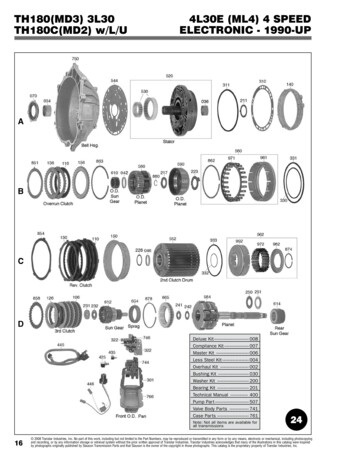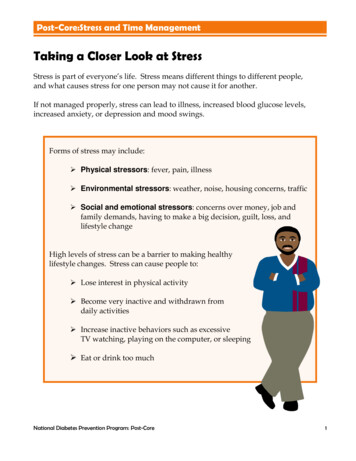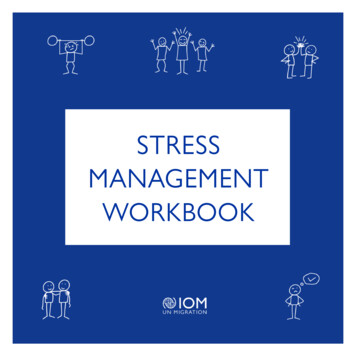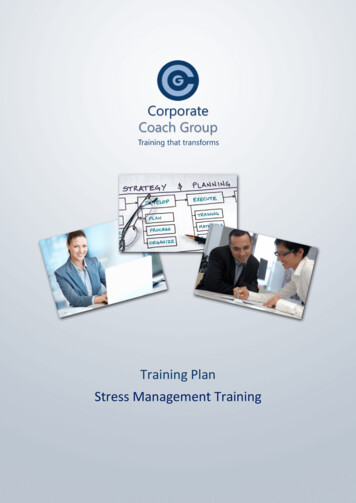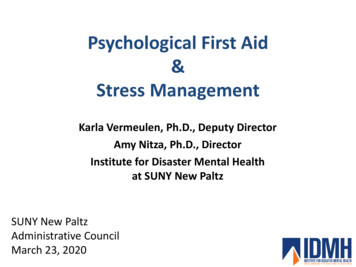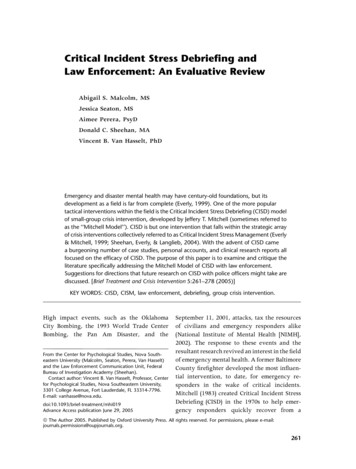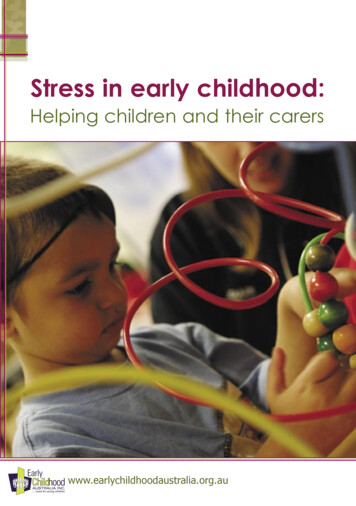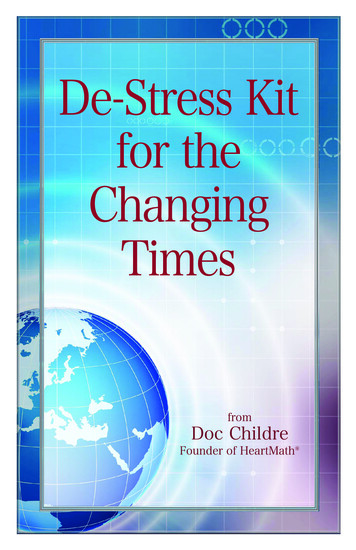
Transcription
De-Stress Kitfor theChangingTimesfromDoc ChildreFounder of HeartMath
If you would like to contribute 1.00 to help bring this bookletand other stress relief information to more people, go ress-Donation If you would like to receive other stress relief informationand receive future writings on stress relief, go tohttp://www.heartmath.org/signupIf you choose, please help us distribute this bookletto others during this time of increased stress.Feel free to post this booklet on your website, emailit to blogs and other websites to post, refer people towww.heartmath.org/destresskit or print and sharecopies with friends, family and organizations. For additional resources, go to www.heartmath.org/destress To view the De-Stress Kit online go towww.heartmath.org/destresskitTo donate by mail:De-Stress KitInstitute of HeartMath14700 West Park Ave.Boulder Creek, California 95006 Copyright 2008 by Doc Childre. HeartMath is a registered trademark of the Institute of HeartMath,14700 West Park Ave., Boulder Creek, Calif. 95006 www.heartmath.orgInstitute of HeartMath is a 501(c)(3) nonprofit research and education organization.
De-Stress Kit for the Changing Timesfrom Doc Childre, founder of HeartMath This booklet applies to anyone who is experiencing extrastress due to the cascading effects of the financial meltdown,natural disasters, the ongoing wars, or for any reason throughthese rapidly changing times.The financial meltdown marks a significant turn of the spiralin the global changes taking place. Global consciousnessis being called on to shift from the pursuit of self-gain at theexpense of others—to a more balanced system of care for therights and needs of the people. Systems and societies haveveered far from the heart and the core values of cooperation,fairness and care for each other and the whole. For manypeople, hope is fading; yet many feel that things are beingturned upside down to become right-side up.Unfortunately, this realignment is causing increased stress andtremendous economic fallout that affects us all. It’s obviousthat the financial realignment process won’t move in theexpress lane, but it can eventually stabilize. Each effort theshot-callers make to significantly take care of Main Street willbe a step closer to the time when the rich, the middle classand the poor can all breathe out again.1
With compassion, I realize that it is much tougher for somethan others. When a crisis occurs, there are different emotionalstages that people go through: shock, anger, blame, despair,grief and more. This process is painful, yet it helps to clearout the shock-overload on our mind, emotions and nervoussystem. After this phase, it’s easier for the heart to reopen.Then, with some self-effort, people can start to rebuild theircoping capacity as they gain more clarity and confidence tomove forward. The process of recovery won’t be the samefor everyone because of different situations and differencesin individual makeup. But be encouraged that you can createa psychological turnaround along the way and increase yourability to cope effectively—especially if you work through thiswith others.Creating a TurnaroundWhen a significant crisis happens, such as the currenteconomic upheaval that is affecting so many, our stresstolerance level depletes from initial shock and emotional pain.This is followed by feelings of overwhelm which inhibit ourcapacity to cope; yet it’s completely understandable why wefeel the way we do.It can be helpful at the onset to experience and vent theemotional buildup to release the steam and the pressingenergy. We need time to experience our shock, grief andanger, or to sit quietly with ourselves in the privacy of our ownpain. After this first phase, however long it takes, we eventuallyneed to engage in thoughts of self-care and remember ourhealth considerations. Then we can make some simple2
efforts to start offsetting the stress effect, which will makecoping much easier. I understand it’s hard at first, but thesimple suggestions in this booklet can help make it easier toreconnect with your inner strength and security.Though we can’t necessarily make our financial challengesand anxieties suddenly disappear, we can do simple things tooffset our recurring stress, reduce fear and reset our capacityto maintain more easily. As we take steps to reduce the stresswhere we can, this adds strength and clarity for sorting ourway through the more difficult areas.Even though things “are as they are,” we can start to makea psychological turnaround within ourselves, so that excessstress won’t create a downward spiral in health. We can offseta lot of stress by practicing some “attitudes of adjustment” untilwe reestablish our coping capacity. This will reduce energydrain and increase clear thinking on how to get the neededhelp for ourselves and our families.When we are experiencing increased stress, it’s often hard tohear some of the points that can most effectively help us. Forthis reason, I will repeat a few different themes in this bookletthat I feel could be the most useful.Here are some practices to help cope with stress andreset our system to move forward in these changingtimes.3
1. Communicate and interact with others.One of the most important things that you can do is tocommunicate your feelings to someone or to a community ofpeople sharing the same experience. Then engage in caringabout others and offering emotional support. This especiallyhelps to reopen your heart, which increases fortitude andemotional balance. Even if you laugh together or cry together,there is often tremendous beneficial release.When people gather to support each other, the energy of thecollective whole multiplies the benefit to the individual. It’sknown that collective cooperation of a group can increaseintuitive guidance and effective solutions for the problemsat hand. When people are in their hearts, and not just theirminds, the collective energy helps to lift the individual spiritwhich releases stress buildup and anxiety overload.In most cases, if you ask around you can find a group ofpeople, small or large, who meet to address the same issuesthat concern you. Some people may have a resistance tobeing around others; but in times of crisis and stress, I wouldurge you to reconsider it. Often it can prevent the acute stressoverload that puts your health at risk. It gets easier as youstart to experience the benefits. You can also find interactivegroups, blogs and helpful services on the Internet.2. Re-opening the heart feeling.When one’s heart reopens, self-security and confidencecan gradually return. Be patient with the process and have4
compassion for yourself. It’s normal at the onset of a crisis forour heart feelings to shut off, especially during the shock andanger phase. When our mind operates too long without theheart’s wisdom, it can start to overload from the sense of loss,then our system gridlocks from anger, fear projections anddespair. It’s understandable to experience this, but it’s reallyimportant to reopen your heart connection with people, as youcan.A good way to reopen your heart feelings is by offeringkindness and compassionate support to one another orvolunteering somewhere to help others in need, even whenyou are in need yourself. Any little acts of kindness orcompassion make a big difference. This is one of the quickestways to reestablish your footing and reduce the stress thatmay affect your health. Research has shown that care andcompassion release neurochemicals that help balance andrestore your system. Worry and uncertainty increase stress,even when you feel that you have good reasons to worry.Much of this type of stress can be reduced by caring for andinteracting with people more.If health problems prevent you from having access to others,you can still benefit from sending care and compassion toothers just in genuine thoughts and feeling. If you can’t leavehome, try to have visitors so you can communicate yourfeelings to help release some of the emotional pressure. Ifthat’s not possible, try to at least communicate with others onthe phone or computer.5
3. Practice appreciation and gratitude.A very helpful exercise for reducing the stress load andrestoring emotional balance is to commit some time each dayto sending genuine feelings of appreciation to someone orsomething—be it children, pets, family members or whateveryou can feel sincere appreciation towards. It’s importantthat the appreciation is genuine (heartfelt and not just mindthoughts), as this activates the body’s biochemical systemsthat help to diminish stress and stabilize your psyche. Whenlow in spirit, the practice of appreciation and gratitude hasproven to help people reconnect with their spirit of hope andthe heart initiative to take progressive steps.4. Decrease drama.Here is another effective way to help stop the energy drainand reduce the anxiety: Practice not feeding the tendencytowards “drama” during this critical time. As we constantly spinthoughts of blame, anger and “doom and gloom” projectionsabout the future, this increases drama which always makes“tough enough” worse. Adding drama to a situation blinds ourpersonal intuitive discernment, which is needed to find themost effective ways to navigate through challenges.Start your practice by not adding excessive drama whensharing with others. When we share genuinely from theheart with others, there’s less tendency to keep amplifyingand repeating the downside of situations—and more of atendency to strengthen and encourage sober support andsolutions. Naturally, there will be some drama while venting6
your feelings to others and that’s okay, especially during thefirst phase of a crisis. But when excessive drama continuesto persist, it blocks solutions because drama drains the mindand emotions, leaving you feeling worse after the interaction.Practice reducing drama, but try not to judge yourself or othersfor creating it. People are doing the best they can until theyget more stable and secure. Try to proceed with compassionthrough all your interactions.More suggestions for decreasing drama:When you catch your inner dialogue looping with excessiveworry or fearful projections, or when in conversations withothers that constantly dramatize the downside of things,gently tell yourself: “That’s not helping to change somethingthat’s already done; it can only make it worse.” Then, makea genuine attempt to realign your thoughts, feelings andconversations with ideas that support your needs and actionplans. Accept that you may not be able to stop all the internaldrama loops and anxiety at this point. But, you can effectivelyreduce your energy drain and offset your stress deficit with thisexercise.If we continue to generate amped up anger, anxiety and fearthrough our mental and emotional system, these feelingsrelease excessive levels of stress hormones, like cortisol andadrenalin, through our body. The long-play version of thiscan cause a cascade of physical health symptoms, alongwith potential mental and emotional imbalances. Decreasingdrama reduces stress overload so that it doesn’t create healthproblems later or make existing health problems worse. As you7
practice, then the energy you save becomes energy that helpsto restore balance, clarity and positive initiative.Take care not to judge yourself if you slip backwards at times.It’s okay. We all do. Just reinstate your heart commitment topractice, and then move on. Each effort you make really helps,however large or small. Efforts will get easier as you realizetheir helpfulness.5. Manage your reactions to the news.In this time of economic and global instability, it’s important notto compound our stress by projecting worst-case scenariosas we watch the news. That’s why it’s so important to practicelistening to the news from the state of neutral. Being neutralmeans not reacting too fast to each story, not jumping toconclusions without all the information, and managing thetemptation to emote and obsess over the negative downsidesof each issue discussed. Maintain your opinions, but practicemanaging how much negative emotional drama you assignto events or disappointments during news broadcasts. Thisis where a large portion of our stress accumulates. Thenpractice being neutral regarding the news throughout the restof your day to avoid pouring excessive emotional energy intoreplaying the issues. There’s a difference between evaluatingan issue versus emotionally obsessing over it, which drainsenergy and can intensify anger, fear or anxiety. By practicingneutral, you can learn to identify and manage the difference inevaluating an issue or being owned by it. It’s okay to maintainyour opinions and views, but it’s important to manage youremotional expenditures to avoid stress overload.8
When you’re under extreme stress and anxiety, it can behelpful to manage the amount of news you watch during aweek. Many people are afraid to watch the news because ofdreading what’s next, and afraid not to watch it in case theymight miss what’s next. When dealing with high anxiety andtypes of depression, cutting back on news occasionally canhelp lower the intensity of fear and anxiety through thesetimes. It’s the intensity that makes fear and anxiety at timesseem unbearable. You have to experiment to see if cuttingback helps you, as it has many others who are experiencinghigh anxiety. You have to decide based on your stress loadand how sensitive your emotional nature is to constant mediadrama around issues that amplify anger or fear. It’s aboutmanaging your media intake according to honest assessmentof your particular situation. We shouldn’t judge the media, aswe are responsible for what we watch and how we react toit. It’s our job to balance and manage our exposure and ourperceptions of how the news affects us.6. Prayer or meditation.Prayer or meditation can make attitude adjustments easier,especially as you center in the heart and try to find a moreobjective state. Radiating compassion to yourself and othersor feeling gratitude is a form of prayer or meditation. It helpsquiet the mind and can bring you new perspectives thatrestore hope and direction. Research has shown that radiatingappreciative or compassionate feelings to other people orissues has a beneficial effect on the hormonal and immunesystems. Anything that boosts or offsets the taxation on the9
immune system is worth practicing, especially in prolongedstress. Sending appreciation, care or compassion also helpsto balance the nervous system and heart rhythm. This, in turn,helps to balance your mental and emotional system, which canhelp with anxiety and types of depression.Whatever your religious or spiritual practices may be,genuinely applying them through these times can be verybeneficial. Using prayer or meditation can help to restorehope and increase confidence. Once hope is re-activated,then confidence is progressively restored. We all canconnect with our source of strength through our heart, butit’s very understandable how stress and crisis can cause adisconnection from our heart feelings at times. This connectioncan be re-established. Many people have experiencedcomebacks from painful places. I have and you can also,through genuine commitment and self-application. My mostimportant step in recovering from a past crisis was reopeningmy heart through deeper care, compassion and appreciationfor others. This sparked the gradual return of my inner selfsecurity—a big missing piece for me in moving on andrecreating my life.7. Heart-focused breathing to reduce stress and anxiety.Practice breathing while imagining your breath passing inand out through your heart area or the center or your chest.Envision yourself as taking a time out to refuel your system,by breathing in the attitude of calm and balance (like breathingin an emotional tonic to take the rough edges off). This can behelpful if you casually focus and are sincere with the process.10
The key to making this exercise effective is to generate thetrue feeling of calm and balance (or whatever attitude youchoose to breathe). You can substitute the attitude of calmand balance at times with breathing the feeling of appreciationor compassion. This can be done in a quiet place or whilewalking, jogging and even in a conversation once you get thefeel of it. It’s real handy for reducing anxiety, anger and milddepression.Heart-focused breathing is being taught by doctors, nursesand clinics throughout the world. It’s especially helpful during acrisis and anytime you experience anger, anxiety or emotionaloverload. After you have practiced these heart-focusedbreathing exercises for a while, you’ll be able to shift stressproducing attitudes more quickly as they come up and resetyour stress tolerance baseline.8. Sleep.Sleep is especially important during times of increased stress.However, many people can’t sleep well because of increasedstress. More are turning to prescription medications than everbefore, but it’s worth checking out alternative methods prior tothat, in case something simple helps. You have to decide whatyou need based on the seriousness of your sleep problem.Breathing the attitude of calm and relaxation for five minutes orso before bed has helped many people get more restful sleep.The Internet offers many suggestions for improving sleep,including exercise and stretching. Some may be effective foryou, some may not. Experiment to see what works, but don’t11
be persuaded to try things that don’t feel right to you. If youhave to take prescription medication, you can start out with lowdoses or cut pills in half or thirds in case less works for you.An important point: If you have a hard time sleeping, get whatsleep you can and try not to continuously worry about it. Mindlooping worry only multiplies the problem as it drains energy,especially when you’ve missed a lot of sleep. Take the steps todo what you have to do, but practice reducing excessive worryabout your sleep patterns.9. Exercise.If it’s convenient, you’ll find exercising very beneficial throughthese challenging times. Often when experiencing anxietyand emotional pain, we don’t have the initiative to exercise.I was that way until I gave it a chance. I soon realized it washelping to spin off and clear the fog and tension accumulatedfrom anxiety, anger and worry. Exercise won’t take away yourreasons for getting stressed, but it strengthens your capacityto manage your stress with less energy loss.You don’t have to do a total workout to help clear your thinkingand stabilize your emotions. Experiment and find what’scomfortable for you, but at least try to get your heart rate upa little for a period of time. Try to be conscious not to replaynegative mind loops while exercising. It helps to balancethe emotions and calm the mind if you practice the attitudebreathing techniques (described in #7) while you exercise.12
10. Reduce comparing now with the way it was.One of the hardest things for any of us not to do after a crisisor major change is to compare the way life was before withhow it is now. That’s really okay initially as we move throughshock, grief or deep loss. The time it takes to vent our angerand recover from despair can be different for all of us—andtime can’t be forced because healing heartache doesn’trespond to schedules or agendas. Yet, in our own time, we willstart to regain some stability and be able to move forward withour life.In a past personal crisis, eventually I realized that to moveforward, it was time to redirect my thoughts and feelingsfrom the past situations I couldn’t change, in order to beat peace now and build the future. After I experienced anunderstandable period of grief, I started to realize that Iwas perpetuating deep pain and depression by constantlycomparing now with the past. Often, my heart’s intuition wouldwhisper: “Constantly comparing with the past is not helpfulfor you now. It’s time now to use your energy to move forwardwith life and your responsibilities.” It was hard at first, but beinghonest with myself, I knew it was time to take a responsiblestep towards reducing the emotional toll and inertia fromdwelling in the past.Below is a practice that helped me. This practice I amsuggesting is mostly for after the first phase of our initialanger, grief or despair. No one would expect us to be ableto stop comparing the past with the present during the firstphase of sadness and despair. Comparing is part of that. Be13
comfortable with your own timing, however long it takes you.Some people do not experience as much loss, pain or despairas others because their situation is different. For them, the firstphase could be much shorter, so they may choose to use thispractice earlier in their emotional recovery process.Suggested practice:With self-compassion and patience, make a genuine heartcommitment to practice recognizing some of your thoughts andfeelings of comparison with the past. As you become awareof these thought loops and feel your energy down-spiraling,realize that it’s normal to have these thoughts and feelings.Yet, know that constant preoccupation with them can drain andrepress your spirit, which you need at this time to re-stabilizeand move forward. Then, in an easygoing way without force,choose something to focus on that doesn’t cause as muchpain and energy drain.It often helps to switch thoughts by changing what you aredoing in the moment or changing the subject if you arerehashing the past with someone. You can also replace thethoughts with appreciation for someone you care about. Withpractice you will be able to recognize the thoughts and feelingsand then just—shift focus—to something that doesn’t bringyou down and leave you with depressed feelings. When thisis done from the heart and not just the mind, then you aretransforming feelings—not repressing them.We can all make progress in restoring our peace, yet wehave to play an active part in it. Emotional self-maintenance14
is an important part. I’m not suggesting that you neverhave thoughts or feelings about your past. Your own heartdiscernment knows when you’re caught in a depressive mindloop or when you’re just appreciating the past with goodmemories.Lots of energy can be saved with this practice and it canespecially help to prevent or soften some of the normaldepression that accompanies an emotional setback. With selfcompassion and patience, you can emerge from the depths ofchallenging times, especially if you connect with the strengththat comes from truly putting your heart into the intention tomove forward. In the past I tried to move forward but withoutmuch progress, then I became aware that I was doing itmostly from the mind with little heart involvement. Whenyou approach your situation with humility and genuine care,this activates the power of your heart, which quickens yourrecovery and re-stabilization.11. Reducing Fear.Fear is multiplied by fanning the flames of drama. After theshockwave of the economic crisis, how could millions ofpeople not be imprinted with fear and uncertainty about thefuture? And now, we are constantly confused by the newsand Internet with conflicting opinions about what to do. It’sreally okay if your present reactions to the sequential crisesare fear from uncertainty and lack of trust. When uncertaintyovershadows spaces that we were once secure in, then fearfeels a need to embrace and protect us. Fear can benefit us asan alarm in fight or flight situations. However, prolonged fear15
exaggerated by drama eventually creates harmful hormonaland immune system responses that compromise our health.These biochemical changes often produce an overload of fearwhen just practical caution would suffice in many situations.Even animals respond differently to fear or balanced cautionfrom people. Fear and caution can sound like the same thing,but the difference between them can make a big difference inwhat hormones are released in your system. Practical cautionreleases beneficial hormones, while prolonged fear releaseshormones that are harmful to your system.Take as long as you need, but after the first phase of shock,anger and initial fear during a crisis, then it’s beneficial topractice reducing the state of fear to an attitude of balancedcaution. There’s a difference in how these two states affect youmentally and emotionally. Constant fear represses your spiritand numbs your heart connection with yourself, your familyand others. This blocks hope, while exhausting the initiative ofthose around you. When living from the state of fear, it ownsyou and can eventually erode your discernment and cognitivefunction which you need through challenging times. Livingfrom the attitude of balanced caution is different: The attitudeof caution is protective yet it allows you to maintain balance,make clear choices, and is much better on your mental,emotional and physical health.With practice you can eventually reduce some of your feelingsof fear to attitudes of balanced caution and discernment. Irespect that it’s hard not to experience frequent waves offear when life is crumbling around us, no matter what form16
of emotional management we try. Sometimes circumstancesleave us with fear that just can’t be helped for awhile. Here aresome suggestions that helped me with this, after I experienceda personal crisis and got tired of living repressed by fear. Justapply these suggestions as you can and don’t be hard onyourself if your progress feels stuck at times.These exercises have helped many people start the processof reducing and replacing fear with a more beneficial state ofmind.Exercise:Tell yourself the following:“I understand why I’m living in fear and anxiety, but it’s drainingmy energy, putting my health at risk and interfering with cleardecision-making.”“I’m tired of being restricted by fear and I’m ready to shift to anattitude that’s easier on my nervous system, my health, andthose around me.”“I’m aware that fear has repressed my spirit and my abilityto make effective choices. My constant fear hasn’t changedanything for the better so I have nothing to lose by exploring anew attitude for moving forward.”“I don’t expect to eliminate all my fears and projectionsovernight, but I commit now to at least practice reducingmy fear to a more balanced attitude of practical caution anddiscernment in places where I can.”17
“I realize that any progress can help free up my mind,emotions and spirit to move on with what needs to be doneand feel better while doing it. I’ll set my own pace in reducingmy fears and will have compassion for myself in the process.”Read this once a day for awhile and don’t care whetheranything changes overnight. By re-reading this, it can help youremember to practice downshifting the feeling of fear to a morebalanced feeling of caution and discernment as you moveforward. Re-reading also helps to anchor this in your emotionalnature which makes commitment and progress easier.Exercise:Sit quietly and from your heart remember that enough stress isalready going on, without having to wear a backpack of fear ontop of that. Breathe quietly through your heart for awhile andimagine that you are breathing in the attitude of courage andstrength to do what you have to do, without being preoccupiedwith fear. Do this with a genuine attitude and it helps withtaking the significance out of fear, which is an important stepin fear reduction. Practice this for a few minutes a day andanytime you feel a strong wave of fear. It can begin to make adifference.I understand and have experienced the grip that fear canhave on us. But, with genuine heart commitment you canmake perception shifts that at least reduce the fear, which willincrease your capacity to feel better while attending to yourneeds. Continue to practice taking the significance out of feara little at a time, as you can. Be easy on yourself; and know18
that it’s really okay when you can’t eliminate all fear or anxietyas it comes up. Understand that any progress counts—whichencourages more progress.12. Engage with your family.Have open communication within your family about the stressthat each of you is going through. It’s important not to bottle upyour feelings and repress the stress, as this only multiplies it.Make agreements to give more allowance and latitude to eachother, or if someone is snappy or irritable at times not to take itas personally. Especially explain this to your children, becausethey usually can’t understand the depth of what the adults areexperiencing. Be as positive around children as you can andreassure them that although times are tough now, we can workthings out in time. Just keep communicating with your family,even if it’s hard at times. It does help.13. Don’t blame yourself.Don’t blame yourself for the crisis, as this only adds stresswithout any benefit in return. Try not to keep replaying inyour mind all the things you could have done to prevent yoursituation. We have all been caught off guard by unexpectedevents and changes, so be easy on yourself. Moving forwardis easier without carrying baggage and guilt from what youcould have or should have done.14. Write a letter from your heart to yourself. (Or youcan use the following letter as your own while mentallyinserting changes to suit your situation.)19
Let the letter be an acknowledgement of where you’re at, andthen let it affirm your commitment to moving forward with yourlife.Dear Self,I have good reasons for the stress, anger andpain that I am experiencing and who wouldn’t, if inmy situation. I am becoming aware of the increasingpersonal stress I’m accumulating because of all theanxiety; trying to make survival decisions for myselfand my family while depressed; finding it hard to getto sleep and when I do, it’s not deep enough to restoremy energy needs; having racing thought loops that onlyproject a hopeless future; fear of job loss, mortgagepressures, re
Institute of HeartMath is a 501(c)(3) nonprofit research and education organization. 1 De-Stress Kit for the Changing Times fr

